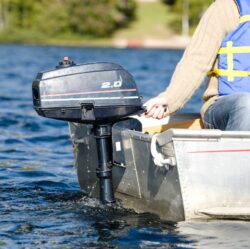Hey there, fellow water enthusiasts! Have you ever found yourself gazing longingly at the vast expanse of the ocean, your trusty Bass Tracker tethered to the dock behind you, and thought, “Is it possible to unleash my freshwater beast into the salty seas?”
*This post may contain affiliate links. As an Amazon Associate we earn from qualifying purchases.
So, can you use a Bass Tracker in saltwater? The answer is yes, but it requires careful preparation, regular maintenance, and additional precautions.
While Bass Trackers are primarily designed for freshwater fishing, with the right modifications and protective measures, they can be used in saltwater environments. It’s important to understand the challenges and risks associated with saltwater usage, such as increased corrosion and potential performance issues.
However, with proper care, including thorough cleaning and protective coatings, your Bass Tracker can handle the demands of saltwater fishing. It’s also crucial to equip yourself with the necessary safety gear, navigate wisely, and stay informed about weather conditions.
By following these guidelines and being mindful of the unique demands of saltwater, you can enjoy the versatility of your bass tracker and explore new fishing opportunities in the salty seas.
Dive in with me into the deep, briny abyss as we dive deeper into the topic of – Can you use a Bass tracker in saltwater? Well, strap on your lifejackets, because we’re setting sail on this hilarious, yet enlightening journey.
Understanding Bass Trackers: A Freshwater Boating Marvel
Now, the beauty of the Bass Tracker, or as I fondly call it, “the Cadillac of freshwater,” is something to behold. It’s like that trusty Swiss Army knife you always have in your pocket, it always has your back in those serene freshwater environs.
The Bass Tracker is akin to a Labrador retriever, loyal and reliable around the lakes and rivers, but will it still fetch your slippers if you toss them into the sea?
These sleek and nifty beauties are designed with a specific purpose, just like a ballet dancer, they are graceful and efficient, perfect for pirouetting around lakes and casting lines in the rivers. But would you throw that dancer into a mosh pit?
Probably not, unless you’re into experimental performance art. However, we’ve all had that curiosity tickle our adventurous side, haven’t we?
Their flat-bottom design, which is as flat as a pancake on Sunday brunch, is great for shallow waters. It’s the secret sauce to why they’re excellent for getting to those hard-to-reach spots in rivers and lakes.
You know, like the best ones, where our fishy friends like to hide. The question is, can they handle the turbulent tango of the ocean waves?
It’s like asking if you can use a kitchen knife to carve a sculpture – it’s not impossible, but surely there are better tools for the job.
You see, my little adventurers, Mia, Jonathan, and Clara, once attempted to use their crayons on our living room wall. While it did result in some, let’s call it “unique” art, we had to explain to them that crayons, much like Bass Trackers, have their designated canvas.
And trust me, trying to scrub off a rainbow unicorn from a white wall is no easy feat.
Saltwater versus Freshwater: The Basic Differences
Now, saltwater and freshwater are like siblings, similar in some ways, but oh boy, can they be different. It’s like comparing a serene spa day (freshwater) to an electrifying rock concert (saltwater).
Both are amazing, but each presents a unique set of challenges.
Freshwater is like a calm, predictable old friend. Saltwater, on the other hand, is more like that rebellious, unpredictable cousin who’s always up for an adventure.
She’s a bit denser (not in the thick-headed way, but in the saltier, more buoyant sense), and can be slightly more demanding on your dear Bass Tracker.
So, let’s get down to the nitty-gritty, the real meat and potatoes of these two siblings:
- Salinity: Saltwater, living up to its name, is a salty old dog. It has a salinity of about 3.5%, which means every liter of ocean water has about 35 grams of dissolved salt. Can you imagine how much extra weight your skinny-dip would carry in the ocean?
- Density: Thanks to all that salt, seawater is denser than freshwater. If you’ve ever tried to float in freshwater and then saltwater, you’ve noticed the difference. It’s like comparing floating on a memory foam mattress versus a pool floatie.
- Biodiversity: The ocean is the host of the party when it comes to biodiversity, with a crazy variety of marine life – it’s like the ultimate all-you-can-eat seafood buffet. Freshwater, however, is more like a cozy potluck dinner.
Now, the important question is – what does this mean for your trusty bass tracker?
The Challenges of Using a Bass Tracker in Saltwater
Navigating the open seas is a whole different kettle of fish compared to cruising down a river. It’s like taking a romantic walk in the park, and then suddenly finding yourself in the middle of a chaotic amusement park.
Your Bass Tracker, my friend, may be a freshwater champ, but throw it in the salty seas, and you’ve got a rookie on your hands.
- Corrosion Risk: Just as sweets are to teeth, salt is to boats. Saltwater is notorious for its corrosiveness. It’s like a seasoned boxer in a ring with your bass tracker. It’s not just the exterior that’s at risk; your boat’s electrical system, motor, and other metal parts are all potential targets for salt’s corrosive right hook.
- Performance Implications: Remember the flat bottom design I mentioned earlier? That design, ideal for serene lakes and rivers, may find itself out of its depth in the ocean. It’s like taking a leisurely bike ride and suddenly hitting mountain terrain. Waves and tides can easily toss and turn your bass tracker, potentially causing instability and safety risks.
| Risks | Freshwater | Saltwater |
|---|---|---|
| Corrosion | Low | High |
| Instability | Low | High |
Don’t worry, though. It’s not all doom and gloom. If you’re still itching to take your Bass Tracker out into the salty abyss, there are ways to make it happen. We’ve all seen an underdog movie, haven’t we?
Well, it’s time for your Bass Tracker to shine.
How to Prepare Your Bass Tracker for Saltwater Usage
Let’s play dress-up with your Bass Tracker, shall we? Prepping your boat for a saltwater voyage is like packing for a tropical vacation when you’ve only ever been camping.
Here are some must-have items for your packing list:
- Marine-Grade Lubricant: It’s like sunscreen for your boat. Coating the vulnerable parts of your boat with marine-grade lubricant will help protect against saltwater corrosion.
- Anti-Fouling Paint: Trust me, you don’t want barnacles crashing your bass tracker party. Anti-fouling paint helps keep your hull smooth and hitchhiker-free.
- Freshwater Rinse: After each salty expedition, give your boat a good freshwater rinse. It’s like a refreshing shower after a day at the beach, washing off all the salt.
The most crucial part of preparing your Bass Tracker for saltwater use is the same as any good stand-up routine – timing. Regular maintenance and cleaning post-saltwater usage is the secret ingredient to keep your boat in ship-shape condition.
- Daily Rinse: Rinse your boat daily, especially after a salty voyage. Think of it as brushing your teeth. You wouldn’t skip it, would you?
- Monthly Check-Up: Look for signs of wear and tear. You know how a stitch in time saves nine? This is the time for that stitch.
- Annual Maintenance: Just like your yearly medical check-up, your boat needs one too. This is when you check the engine, clean the bilge, and more.
Taking your Bass Tracker into saltwater is a bit like teaching an old dog new tricks – it takes patience, care, and plenty of treats. Or in this case, a regular spritz of freshwater!
Essential Gear for Saltwater Fishing with a Bass Tracker
Now, remember when you were a kid, and your parents would never let you leave the house without your hat and sunscreen? Well, saltwater fishing has its own must-have gear, and I’m not just talking about a bigger fishing rod.
- Safety Equipment: Safety is paramount, especially when you’re out in the big blue. Lifejackets, flares, and a radio should be at the top of your list. As they say, it’s better to be safe than sorry!
- Navigation System: Saltwater bodies can be unpredictable, just like a clown at a kids’ party. A good navigation system can guide you through any unexpected surprises.
- Appropriate Bait: Remember, saltwater fish are different from their freshwater cousins. They prefer the fine dining experience, so make sure you have the right bait to attract them.
| Essential Gear | Why You Need It |
|---|---|
| Safety Equipment | For emergency situations |
| Navigation System | To guide you through unpredictable waters |
| Appropriate Bait | To attract saltwater fish |
Remember, the right gear can make the difference between an epic adventure and a fishy fiasco.
Risks & Long-term Effects of Saltwater Exposure on Bass Trackers
Now, before you set sail, let’s chat about what long-term saltwater exposure can do to your beloved Bass Tracker. It’s like taking a sun-loving plant and moving it to the shady part of your garden – sure, it might survive, but it’s not going to thrive.
- Corrosion: I’ve mentioned this before, but it’s worth repeating – saltwater is corrosive. It’s like the slow drip of a leaky faucet; over time, it can cause significant damage.
- Paint Damage: Saltwater can cause your boat’s paint to peel over time. It’s like leaving a painting out in the sun – eventually, it will start to fade.
- Motor Wear: Your motor has to work extra hard in saltwater due to the increased density and resistance. This can lead to faster wear and tear. Think of it as running on a sandy beach versus a paved road.
| Long-term Effects | Damage Level |
|---|---|
| Corrosion | High |
| Paint Damage | Medium |
| Motor Wear | High |
To prevent these potential problems, regular maintenance and proper care are vital. Remember, a happy boat equals a happy boater!
Tips & Tricks for Bass Tracker Saltwater Fishing
A wise man once said, “Good advice is like a good fishing spot, it’s gold.” So here are some golden nuggets of wisdom for you to pocket:
- Check Weather Conditions: Remember, the sea is a fickle mistress. Always check the weather before setting sail. It’s better to be on land wishing you were at sea than at sea wishing you were on land.
- Stay Near the Shore: Until your Bass Tracker has earned its sea legs, it’s best to stay close to the shore. Just like a toddler at a pool, start in the shallow end.
- Regular Check-ups: Keep a close eye on your boat’s health. If you notice any rust or corrosion, attend to it immediately. It’s like spotting a weed in your garden – remove it before it spreads.
| Tips | Why It Matters |
|---|---|
| Check Weather | To avoid rough sea conditions |
| Stay Near the Shore | To ensure safety |
| Regular Check-ups | To prevent major damage |
Remember, every great journey begins with a single step, or in this case, a single paddle stroke. Start small, take the necessary precautions, and your bass tracker might surprise you.
In the end, the question, “Can you use a Bass Tracker in saltwater?” boils down to how much you’re willing to adapt, prepare, and maintain. Remember the tale of my little adventurers and their crayon art? It’s possible, but it might take a bit more elbow grease than you think.
With every venture into the salty abyss, remember to laugh heartily, reel in knowledge, and enjoy the journey as much as the destination. After all, life is a lot like boating, isn’t it? The fun isn’t just in arriving at your destination, but in the joy of the journey itself.
So grab your life jacket, don your captain’s hat, and let’s continue our voyage through the salty seas of knowledge.
The Bass Tracker Advantage in Saltwater Fishing
Now that we’ve navigated the tricky waters of potential challenges, let’s chart a course towards the perks of taking your Bass Tracker into saltwater. As they say, every cloud has a silver lining, and saltwater fishing with your bass tracker is no different.
- Maneuverability: The compact and lightweight design of your bass tracker is a boon in the bustling world of saltwater fishing. It can zip through narrow channels and shallow areas where larger vessels wouldn’t dare venture. It’s like being able to squeeze through the crowd at a sold-out concert.
- Versatility: With the right preparations, your bass tracker can transition from a freshwater champ to a saltwater warrior. It’s like a superhero with a secret identity.
- Affordability: Compared to specialized saltwater boats, a bass tracker is a more affordable option. It’s like choosing a versatile buffet over a fancy five-course meal.
| Bass Tracker Advantages | Explanation |
|---|---|
| Maneuverability | Navigate narrow and shallow areas |
| Versatility | Useful in both freshwater and saltwater |
| Affordability | More cost-effective than specialized saltwater boats |
So remember, folks, it’s not about the size of the boat in the fight, it’s about the size of the fight in the boat!
Conclusion: Can You Use a Bass Tracker in Saltwater?
And there you have it, folks! We’ve sailed through the choppy seas of uncertainty and arrived at our destination. Can you use a Bass Tracker in saltwater? Well, as we’ve seen, the answer is a resounding “Yes, but…”
Yes, but you’ll need to take a few extra steps for preparation and maintenance. Yes, but you’ll need to invest in some additional gear and upgrades. Yes, but you’ll need to stay vigilant about the health of your trusty vessel.
Remember, boating is a lot like stand-up comedy. You’ve got to know your audience, adapt to changing situations, and always be prepared for a little heckling. But with the right tools, a sense of humor, and a dash of adventurous spirit, you’ll be ready to take the spotlight…or, in this case, hit the high seas!
Until next time, folks. May your lines be tight, your sunsets be bright, and may you always have a good fish story to share around the campfire. Now go out there and make some waves!









